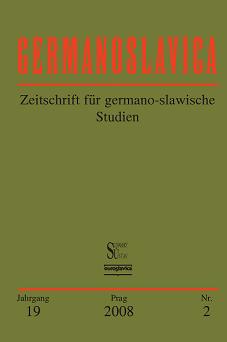Das Bild der sowjetischen Gesellschaft in Wolfgang Koeppens Reisebericht ‘Herr Polevoi und sein Gast’
Das Bild der sowjetischen Gesellschaft in Wolfgang Koeppens Reisebericht ‘Herr Polevoi und sein Gast’
Author(s): Marie FrolíkováSubject(s): Language studies
Published by: AV ČR - Akademie věd České republiky - Slovanský ústav and Euroslavica
Summary/Abstract: The treatise concerning the picture of the Soviet society in the travel essay ´Herr Polevoi und sein Gast‘ written by Wolfgang KOEPPEN follows three aims. First of all I want to show, how KOEPPEN depicts the Soviet culture in the 1950s of the last century considering especially literature. In Koeppen`s ´Herr Polevoi und sein Gast‘ the Soviet culture and politics are brought into a logical connection. I intend to examine how in KOEPPENS`S presentation the Soviet concept of arts deals with the traditional European culture and the culture of modernism. Secondly my study relates to KOEPPEN`S description of the everyday life of the Soviet people. I concentrate particularly on the way how KOEPPEN describes the influence of the political propaganda in all the spheres of the life of the Soviet people. Further I pay attention to the depiction of the megalomaniac endeavours of the Soviet politicians and national economists in the field of the economy, especially in that of the building industry and the production of electricity. It is important to mention that KOEPPEN presents the point of view that the megalomania of the Soviet industry results in the disappearance of the human moderation – this disappearance stimulates the desire after a kind of bourgeois and in a certain sense anachronistic harmonious way of life in the family. This desire does not undermine the sphere of the work paradoxically, but it supports it because it puts an emphasis merely on the materialistic values. KOEPPEN remarks on the secularization of the Soviet society and demonstrates the metaphysical pride and the anthropocentric base of the Soviet communism in this way. He also shows the discrepancy between the socialistic ideas and their realization in practice – this especially giving concrete examples of the infringement of the idea of equality. The third purpose of the treatise is to find the reasons for the fact that KOEPPEN does not express his opinion of the crimes of Stalinism. It should be shown that the way KOEPPEN portrays his visit in the Soviet Union is strongly influenced by his tendency towards artistic authenticity and that this reduces the political dimension of the text. Finally I would like to point out that the so called DFG-Project exists at the Faculty of Linguistics and Literary Science of the University in Bielefeld nowadays, which deals with the travel books of Wolfgang KOEPPEN. On the initiative of this project the volume number eight of the collected works of Wolfgang KOEPPEN was published in November 2007 – under the title of ´Nach Rußland und anderswohin´. The author of the afterword is Prof. Dr. Walter ERHART. I would like to thank him for sending me one version of the epilogue. It helped me to find important information regarding the circumstances of Koeppen`s visit in the Soviet Union. The activities of the DFG-Project documents that German scholars still take a deep interest in the work of Wolfgang KOEPPEN.
Journal: Germanoslavica
- Issue Year: XIX/2008
- Issue No: 2
- Page Range: 19-48
- Page Count: 30
- Language: German

